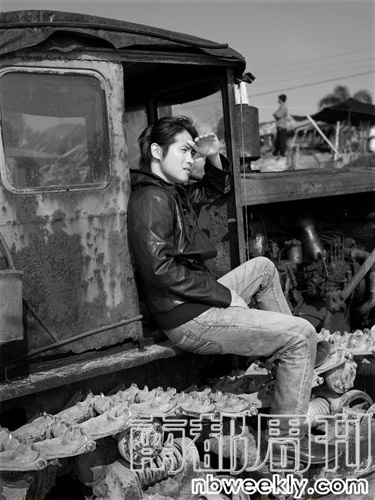
With boyish good-looks and a rebel's cred, Han becomes one of China's most popular and recognizable bloggers.
Han Han, China's most popular blogger and one of its best-selling authors, has posted provocative blogs on the themes of revolution, democracy and freedom that have sparked heated online debates since the end of 2011.
Dubbed an unofficial voice for his generation, the 29-year-old has urged the government to stop its censorship and allow for greater freedom of expression.
"First of all, as a member of the culturati, I ask to be able to write more freely in the new year," he is quoted by the EastSouthWestNorth blog (ESWN) which translated Han's essay On Freedom.
"At the same time, I ask this on behalf of my colleagues—because media workers also need some freedom of the press. The press has been strictly controlled to date. Then there are my friends in the film industry whose pain and sorrow you cannot understand. Everybody is conducting cultural activities as if they were stepping through a minefield," Han wrote.
On the topic of revolution, the author has replied to the most critical question--does China need a revolution—by answering directly that "revolution is something that sounds passionate and has instant results. However, this may not be the best course of action for China."
"First of all, a revolution usually begins with a demand, which today is most commonly an anti-corruption plea. But this kind of demand isn't gaining any momentum, as "freedom" and "justice" do not have a market, so to speak. With the exception of certain artists or journalists, if you ask people in the street whether they feel free, most of them will answer in the affirmative; if you ask them whether they want justice, they will typically say that injustice is usually something that happens to other people and they are happy as long as it doesn't happen to them," ESWN noted online.
"In China, it is hard to find a unifying demand. This is not a matter of need versus no-need, but one of the possible versus impossible. My view is that revolution is neither possible nor necessary. But if you ask me whether China needs stronger reforms, I will say it certainly does," Han clarified.
Han explained further that he does not believe a revolution akin to the Velvet Revolution (November 17-December 29, 1989) in Czechoslovakia can take place in China, since it requires a combination of tolerant authorities, intellectual leadership and a belief in the quality of the people; the writer is not confident these exist in China.
He explained that while many intellectuals admire the Velvet Revolution, and style themselves after Czech dissident Vaclav Havel, in reality the role of intellectuals will be far less important than what they imagine in their hypothetical revolution, reported the Want China Times, a Taiwan-based English newspaper.
Han explains why: "The poorer the quality of the citizens, the more diminished the importance of intellectuals to social change; you cannot use mere words to describe the perfect democracy, freedom or human rights." He added, "You cannot expect rulers to read a few books and suddenly be moved to hand everything over to you. You cannot expect that if every Chinese citizen were to receive a voting ballot that their votes could not be bought."
Han concludes that he does however see changes ahead, pointing out "a country like ours does not need a revolution, because when the quality of civic life and the educational level of China's citizens reach a certain standard, everything will happen naturally."
His remarks provoke even some of his staunch supporters to anger, and they have criticized him for his lack of logic and education. Some experts believe that the young writer's opinions are immature, since revolution is possible anywhere, anytime.
"You can rely on your talent to be a writer, but when discussing ideology, you need some background training," suggested Wang Xiaoyu, a scholar in Shanghai.
However, some admire Han's sophistication, believing that he is urging people to enrich their own lives rather than call for a collective, large-scale revolution, the Want China Times said in his defence.
Facing the comments his blog stirred up, most of which were negative, Han stressed that he is an independent person exercising his own judgment. Yet, in an interview with the South Weekly, he admitted that he has also been known to compromise and apple-polish others from time to time.
The Chinese government has improved on the freedom of speech front in recent years, but even so, writing remains rather dangerous and quite a difficult profession to strike a balance in," Han admitted to CNN in an interview in 2010. "But I believe you still need to try, despite these difficulties, he went on, "because the situation only improves when more people try; and if no one is trying, it naturally gets more and more difficult."
With boyish good-looks and a rebel's cred, Han has become one of China's most popular and recognizable bloggers. In 2009, Han was listed as one of Time magazine's 100 most influential people.
"What separates Han from other popular bloggers is, I think, his attitude. He is provocative and he reflects some of the anxiety young people feel about the way China is today," Jeremy Goldkorn, a China media watcher and commentator, told CNN.

Copyright ©1999-2011 Chinanews.com. All rights reserved.
Reproduction in whole or in part without permission is prohibited.